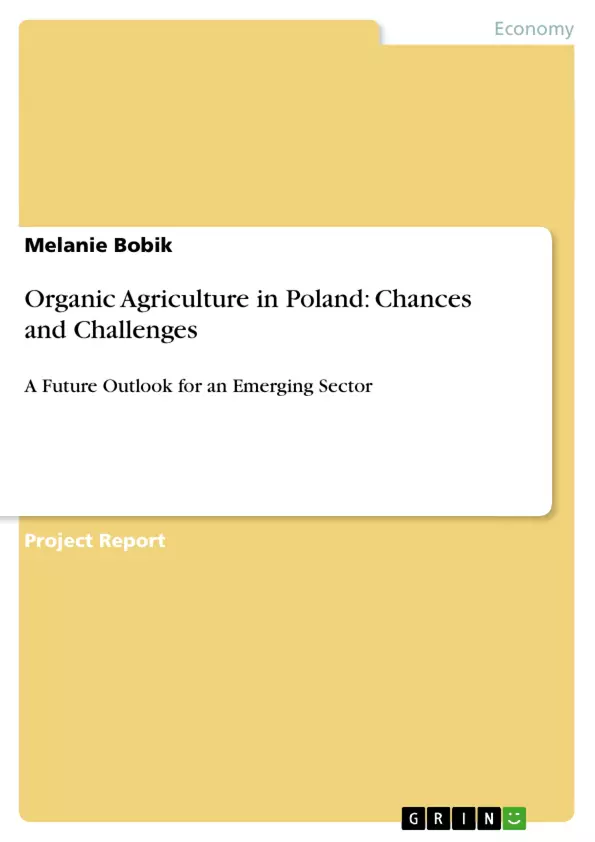Polish organic products are of above-average high quality, according to a recent report of the Supreme Chamber of Control (NIK), Poland’s supreme audit institution. But what is behind this industry, what are the chances and challenges, which regulations are there and who is responsible for certifications?
The Polish organic market is growing fast and expanding despite the economic downturn. This paper describes the emergence and characteristics of this industry sector and investigates its future outlook.
Inhaltsverzeichnis (Table of Contents)
- Introduction
- The Emergence of Organic Agriculture in Poland
- A Highly Subsidized Industry
- Organic Farms Locations, Size and Land Use
- Certification Programs for Organic Food
- Market Share and Challenges
- Future Outlook for the Organic Sector
Zielsetzung und Themenschwerpunkte (Objectives and Key Themes)
This paper examines the emergence and characteristics of the organic agriculture industry in Poland, analyzing its future prospects and challenges. It specifically delves into the rapid growth of the sector, the role of government and EU subsidies, and the key factors influencing the organic food market in Poland.- The emergence and development of organic agriculture in Poland
- The impact of government and EU subsidies on the growth of the sector
- The geographic distribution, size, and land use of organic farms in Poland
- The role of certification programs in ensuring the quality and integrity of organic products
- The challenges and opportunities facing the Polish organic sector
Zusammenfassung der Kapitel (Chapter Summaries)
- Introduction: This chapter introduces the topic of organic agriculture in Poland, highlighting its rapid growth and the high quality of Polish organic products. It also provides a brief overview of the paper's objectives and scope.
- The Emergence of Organic Agriculture in Poland: This chapter traces the history of organic agriculture in Poland, from its beginnings in the late 1980s after the fall of communism to its present-day status as a significant industry sector. It discusses the role of privatization, the formation of organic farmers' associations, and the adoption of EU organic farming standards.
- A Highly Subsidized Industry: This chapter examines the role of government and EU subsidies in promoting the growth of organic agriculture in Poland. It highlights the significant financial support provided to the sector and discusses the impact of these subsidies on farm size, land use, and market share.
- Organic Farms Locations, Size and Land Use: This chapter delves into the geographic distribution, size, and land use patterns of organic farms in Poland. It compares the characteristics of organic farms to those of non-organic farms and analyzes the factors influencing the location of organic farms across the country.
- Certification Programs for Organic Food: This chapter explores the regulatory and certification framework for organic food in Poland. It discusses the evolution of the certification system, the role of government and private certification organizations, and the importance of organic labeling in ensuring consumer protection and market integrity.
Schlüsselwörter (Keywords)
This paper examines the themes of organic agriculture, subsidies, market growth, certification, and consumer demand within the context of the Polish organic industry.Frequently Asked Questions
How is the quality of Polish organic products rated?
According to the Supreme Chamber of Control (NIK), Polish organic products are of above-average high quality.
Is the organic market in Poland growing?
Yes, the Polish organic market is growing rapidly and expanding despite general economic downturns.
What role do subsidies play in Polish organic farming?
The industry is highly subsidized by both the Polish government and European Union funds, which significantly drives its growth.
How are organic products certified in Poland?
Certification is handled through a framework involving both government bodies and private certification organizations to ensure EU standards are met.
What are the characteristics of organic farms in Poland?
The text analyzes farm locations, sizes, and land use patterns, noting that organic farms often differ significantly from conventional farms in these aspects.
What challenges does the Polish organic sector face?
Key challenges include maintaining market share, navigating complex regulations, and meeting increasing consumer demand while ensuring product integrity.
- Quote paper
- M.A., MBA Melanie Bobik (Author), 2010, Organic Agriculture in Poland: Chances and Challenges, Munich, GRIN Verlag, https://www.grin.com/document/214024



